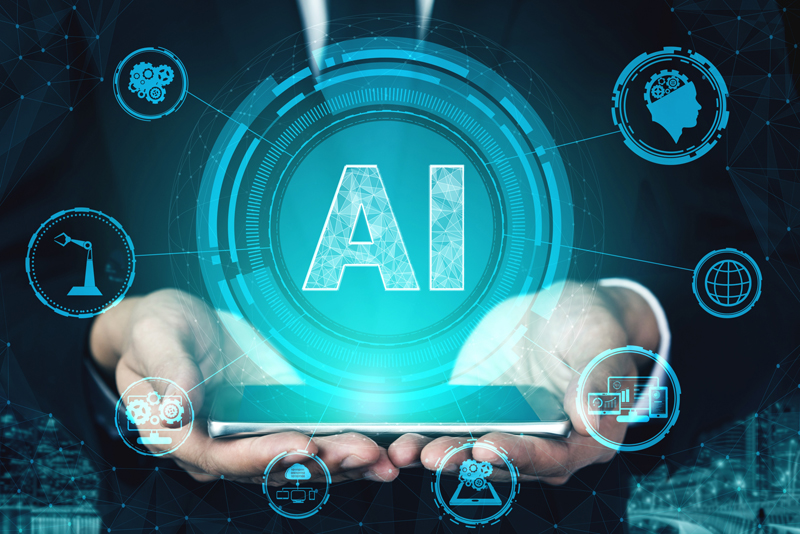Artificial intelligence (AI), also called machine intelligence, is unlike the natural intelligence shown by humans and animals, it refers to the intelligent programs made by humans to mimic the cognitive functions associated with the human mind such as “learning” and “problem-solving”. AI can affect data entry services in a way that data entry processes are automated to enhance data accuracy, reduce any possibility of human errors, etc.
Artificial intelligence technology is rapidly and radically changing the various areas of our daily lives and considering the advantages of AI, the demand for it is increasing. It is used in a wide range of fields and industries such as healthcare, finance, education, transportation, and more.
AI applications can perform complex and intelligent functions associated with human thinking and can offer perfectly consistent real-time decisions at scale. By capturing and analyzing data from a variety of sources including sensors, remote inputs and microchips, these software platforms transform and automate modern software development. So, have a look at the top AI platforms of 2020:
-
- Microsoft Azure AI Platform: This platform offers cloud-based advanced analytics designed to simplify machine learning for businesses. Microsoft Azure AI Platform offers key AI capabilities, so it is a popular choice for AI application development among software developers.
The key capabilities of Azure AI platform are:
- Machine Learning
- Vision capabilities like object recognition
- Speech recognition capability
- Language capabilities like machine translation
- Knowledge mining
The machine learning (ML) capabilities of Microsoft Azure Platform include its:
- Python-based automated ML service – Azure ML
- Azure Databricks, which is an Apache Spark-based big data service that integrates with Azure ML
- ONNX, which is an open-source model format and runtime for ML
- Microsoft Azure AI Platform: This platform offers cloud-based advanced analytics designed to simplify machine learning for businesses. Microsoft Azure AI Platform offers key AI capabilities, so it is a popular choice for AI application development among software developers.
Artificial Intelligence apps and agents are offered by Azure AI platform, you can customize them to use in your application. These include Azure Cognitive services, that offer a wide range of domain-specific pre-trained AI models such as Vision, Speech, and Language.
- Google Cloud AI Platform: The platform offers AI capabilities such as machine learning, deep learning, Natural Language Processing, and Speech and Vision capabilities for software development on the cloud.
- Machine Learning: An integrated toolchain is offered that enables software developers to easily develop ML models and speed up the development and deployment process.
- Deep Learning: To help software developers create deep learning applications, Google Cloud AI Platform offers pre-defined Virtual Machines (VMs). You can provision this VM quickly on the Google cloud that encapsulates popular AI frameworks. You can add Google Compute Engine instances with already installed popular AI frameworks such as PyTorch, Scikit-learn, TensorFlow and others as well.
- Natural Language Processing (NLP): The NLP capabilities of Google Cloud AI Platform can be used to find the meaning and structure of a text. Google NLP capabilities can be used to analyze text, with Google NLP API which is a RESTFUL API.
- Speech: Google Cloud AI Platform has APIs for speech recognition capabilities, that means it is capable of converting speech-to-text and text-to-speech. Its speech-to-text capability can convert audio to text and it uses neural networks models for this. The speech-to-text API is built to support 120 languages and their variations. The speech recognition capability helps software developers enable voice command and control features in their app.Google text-to-speech API enables software developers to create natural-sounding speech from text, which is very helpful to convert audio files of popular formats like MP3 or LINEAR16.
- Vision: Software developers can use the vision capability of Google cloud AI Platform to derive insights from images. The vision capabilities are offered through REST and RPC API which use pre-trained machine learning models. Using these APIs, your app can detect objects and images and read printed and handwritten texts.
- IBM WATSON: IBM WATSON is quite popular and has advanced AI capabilities. It is popular for its open AI for any cloud environment and it’s pre-trained and pre-integrated on flexible information architecture. This will speed up the development and deployment of AI application models. BM WATSON AI SOLUTIONS are particularly tailored for several industries like:
- healthcare
- oil & gas
- Internet of Things (IOT)
- financial services
- advertising
- media
IBM WATSON offers the following to expedite AI app development:
- IBM WATSON has developer tools like SDKs with detailed documentation.
- Developers can integrate WATSON Assistant to build AI-powered conversational interfaces into their app.
- They can also access an AI-powered search technology called WATSON Discovery to help them retrieve information that resides in silos.
- IBM WATSON has NLP capabilities known as WATSON Natural Language Understanding (NLU). It extends IBM WATSON speech-to-text capabilities to developers when building on the WATSON developer platform.
- The resources of IBM WATSON developer offer Software Development Kits (SDKs) for Swift, Java, Python, .Net, Ruby, Node.js etc. This enables developers to find a suitable SDK for their projects.
- INFOSYS NIA: It is a knowledge-based AI platform that allows software developers to build AI-powered apps which offer the following AI capabilities:
- Machine Learning: Nia Advanced ML offers a wide range of ML algorithms operating at speed and scale, which simplifies building high-performing ML models.
- Contracts analysis: It is a platform that enables businesses and law firms to navigate complex contract documents. The capabilities include ML, deep learning and semantic modelling.
- Nia Chatbot: Here AI-powered chatbots with Nia can be built by developers, and their app can provide access to enterprise knowledge repository. The app can also automate actions through a conversational interface.
- Nia Data: Developers can integrate their AI app with Nia Data, a robust analytics solution offered by Infosys.
- BigML: The BigML development platform offers powerful ML capabilities. For supervised and unsupervised learning, it provides robust ML algorithms. Using the REST API of BigML platform, software developers can implement access instantly both on-premises and on the cloud.BigML has the following features:
- It is programmable and repeatable.
- BigML supports languages like Python, Node.js, Ruby, Java, Swift, etc to code your app.
- Has robust security and privacy features.
- Helps you to automate your predictive modelling tasks.
- Has smart infrastructure solutions which help in scaling the app.
- Dialogflow: It uses Google’s Infrastructure; besides, it integrates with Google’s ML capabilities. It lets developers build voice and text-based conversational interface for their app. The app can run on both web and mobile and connect users on Google Assistant, Amazon Alexa, Facebook Messenger, etc as well. Since it runs on Google Cloud Platform it enables to scale the AI app easily. The key capabilities of Dialogflow are ML, NLP, and speech.
These are the top six Artificial Intelligence Platforms that are capable of creating intelligent behavior including reasoning, learning, problem solving and more. Since 90% of human effort in the data entry services industry can be done with the help of automated artificial intelligence, businesses save manpower and costs and gain access to high-quality data. Digitizing repetitive tasks can help enterprises cut costs on paperwork and labor, eliminate human error and thus boost efficiency and enjoy better business outcome.




